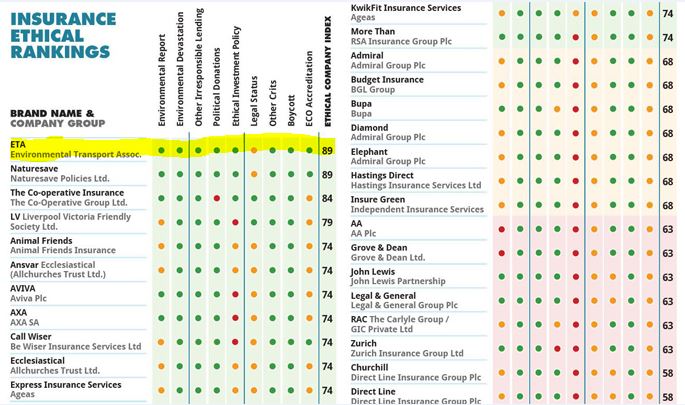
The use of titles to distinguish between married/unmarried women, but not men, is not only outmoded, but discriminatory so as a business we’ve now stopped using titles entirely with all our customers in written or emailed correspondence.
From the start of this month, none of our written communications have included honorifics of any kind.
We know it’s a small step, but we are proud to be part of the move towards equality. After all, we are considered ethical in Britain. The Good Shopping Guide each year reveals the good, the bad, and the ugly of the world’s companies and brands, with a view to supporting the growth of social responsibility and ethical business as well as a more sustainable, just society.
Beating household-name insurance companies such as John Lewis and the Co-op, we have an ethical company index score of 89 – earning us joint-first place with Naturesave.
According to The Good Shopping Guide: “There are some insurers who can be regarded as ‘ethical specialists’. Naturesave places 10 per cent of premiums into a fund which finances projects that benefit the environment. The company offers a free environmental performance review to businesses and charities to help spread awareness of sustainable development. The ETA aims to bring about positive changes in Britain’s travel habits by raising awareness about the impact of excessive car use. It provides travel and bicycle insurance as well as breakdown cover for cars and mobility scooters. See eta.co.uk for further details.”

Your Journey. Our world
The ETA was established in 1990 as an ethical provider of green, reliable travel services. Twenty seven years on, we continue to offer home insurance, cycle insurance, travel insurance and breakdown cover while putting concern for the environment at the heart of all we do.

Michael Wickson
So, no honorifics. No Mr, Master, Mrs, Miss, Ms, Sir, Madam. How do you address strangers? Is it full name; first name; surname; no name; what? Is there a generally accepted convention?
The ETA
In written communication we are now using first name and last name. When you call us, we give the choice of how to be addressed.
Tony Williams
The generally accepted convention is that you use Mr and Master for males, according to their age, and there are other well-established conventions for the use of Mrs, etc. But some people love to construct artificial complications about “discrimination” and get worked up about what to do instead.
Mary Fisher
I’m Mrs Fisher and very happy to be so. If I were not married I’d be very happy to be Miss Livock. My. ‘surname’ is the name of a man in either case, my husband or my father. ‘Miss’ and Mrs’ are both diminutives of the word ‘Mistress’ – i’m very happy to be called ‘Mistress’ too. What I’m not happy about is to be called ‘Ms’ which is the diminutive of ‘meaningless’. Yes, Tony Williams, ‘discrimination’ has lead to artificial complications. It’s all bollocks.
John Fleming
1/ What about Doctor (Dr), Professor, Reverend, Lord, HRH etc?
2/ The table of Insurance Ethical Rankings uses coloured dots but you do not explain the meaning or significance of the colours. And as there are dark red dots but not a dark red balloon I presume the two are not connected.
3/ The repeated drifting of the balloons and jumping back to the higher point is simply irritating.
4/ Did anyone test out this page on a disinterested person or better still, more than one? If not why not?
John
Elspeth Dewar
One’s perception of a person alters slightly according to their title, especially with women, even though it is usually completely irrelevant, so well done ETA. Let’s hope this trend continues.
Howard Cheesman
Well done. You have caught up with the Religious Society of Friends (Quakers) who have been treating all equally since the C17th with no titles or honorifics. There is a good reason for this: it is not just quirky eccentricity or some sort of cranky religious attitude. We are all “Children of God” to use the early Friends arcane language but the import is that we are created equal and deserve to be treated as such. Titles set people up against each other as they demarcate some as more worthy than others. Who needs them anyway? Nice one – ETA! Glad I found you.
Michael Wickson
OK, ETA. How about an answer to my question above? What fresh convention will you be using?
Mrs Smith
Rather than jumping on the PC bandwagon how about asking your customers how they’d like to be adddressed? Personally I find first name terms a bit over familiar for what is a professional relationship. I’m proud to be married and my title reflects that.
Iain Dawson
None of my correspondence with the bank nor with the DVLA has an honorific attached to my name simply because I’ve never given them one. They seem to communicate with me just fine – they just use my name when talking to me. It really is that simple.
Martin Bishop
My sister has a gender free title, “Reverend”.
I was taught that, at the start of a formal letter, “Dear Sir” or “Dear Madam” is appropriate, but if you don’t know the gender of the recipient, you are forced to use the clumsy construct, “Dear Sir or Madam”. This clumsy formal address is also a way of starting a letter when you don’t know the gender of the recipient, as happens all too often if only the surname and initials of the forenames are known.
Bryn Jones
Titles are sexist, patriarchal, capitalistic, unnecessary, and demeaning.
Most parents like to make their children their heirs. Until recently, wives had few rights or possessions of their own. When a woman has a baby, she can be certain that it is hers, because it has come out of her body, (unless her baby has been secretly substituted). But without DNA tests there can be a doubt, however small, whether the husband is the father. Surveys have demonstrated that the ties between a mother’s side of the family and a baby tend to be slightly stronger than those of the father’s side. For instance, grandparents tend to see their daughters’ children more often than their sons’, and siblings tend to favour their sisters’ children over their brothers’. Because the baby is his heir, the husband wished to be as certain as possible that the baby was his.
Samuel Johnson wrote “Upon the chastity of women all the property in the world depends. We hang a thief for stealing a sheep, but the unchastity of a woman transfers sheep, and farm, and all from the rightful owner.” The husband endeavoured to ensure that his wife was faithful to him. He signified his control over her by changing her name to his, changing her title from Miss to Mrs, and putting his ring on her finger. Both he and society dictated her appearance and behaviour in order to emphasise her unavailability. She was discouraged from independent thought or activity, or discoursing with men. He named their children after him. The word surname means sire’s name. Men own their daughters and give them away to other men to own. All this was supported by society’s mores which were essentially set by men. Some of these attitudes prevail today. And it is all based on ownership, property, and materialism. In 1074, the Vatican passed a law stating that priests should not marry – not to stop them having sex, that was perfectly acceptable – but to prevent their offspring from making any claims against church property.
We have actress but not doctoress and professoress because it was so utterly unthinkable that women would ever be doctors or professors. In ‘Man Made Language’ Dale Spender explains not only how completely we are our language, but how extremely and insidiously male-oriented our language is. How, for instance, female words – queen, lady, dame, madam, mistress, cow, bitch, sow, etc, have become devalued contrasted with their male counterparts. How there are ten times more words for a sexually promiscuous woman than for a man.
Titles are unnecessary. In the vast majority of cases we don’t need to know the gender or the marital status of people to deal with them. As a rational person I therefore advocate their abandonment. People will soon become accustomed to addressing each other in a different way. I would like parents to give children names that are not the parents’ names, and that need not reflect the sex of the child. The child could choose its own names when older. When people are not conscious of the sex of a person except when it is necessary, I hope that it will be a pleasantly liberating experience for non-bigots.